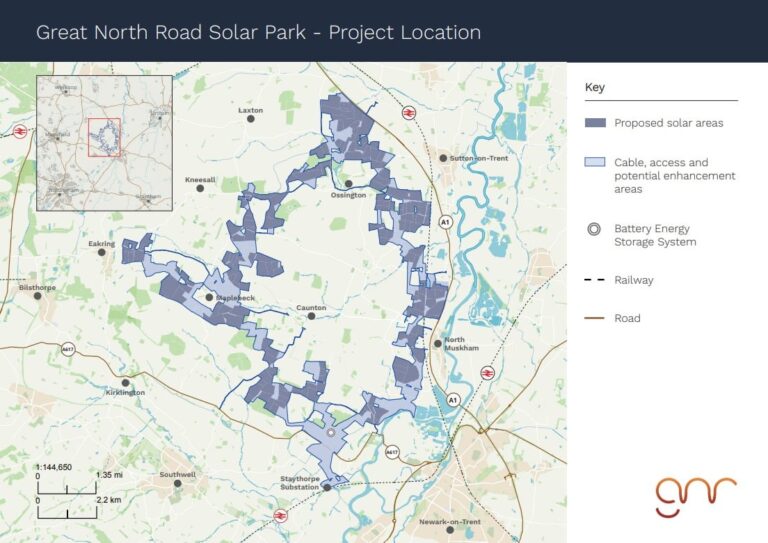British renewable energy developer Elements Green has announced that it will turn its 800MW solar power plant in Newark, Nottinghamshire, into a “biodiversity paradise”.
The developer is working with the RSPB, Sherwood Forest Trust, Nottinghamshire Wildlife Trust and the Trent Rivers Trust to ensure wildlife benefits from the Great North Road Solar Park. The project will be renamed ‘Great North Road Solar and Biodiversity Park’ to reflect Elements Green’s commitment to improving the local environment.
UK project director Mark Noone said: “Our commitment will ensure that 850 hectares of land is dedicated solely to positive ecological management, an area more than twice the size of Sherwood Forest Center Parcs.
“It will consist of wetlands, grasslands and other environmentally focused land management projects. Nottinghamshire Wildlife Trust will ensure these deliver the greatest benefits for nature, while Trent Rivers Trust will be central to working on wetlands.”
The plans also include planting 50,000 new trees, with the RSPB helping to design new woodland and grassland habitats.
Charlotte Martin-Taylor, head of Business Conservation Advice at the RSPB, said becoming a business conservation parent was an opportunity to unite and “tackle the urgent biodiversity and climate crises”.
Chris Hewett, CEO of industry body Solar Energy UK, welcomed the partnership, which is the first of its kind in the solar sector, and said: “There is now abundant evidence of the biodiversity benefits that solar farms can bring, such as is evident from our annual Solar Habitatological monitoring reports. Nevertheless, surveys have shown that the public considers impacts on nature to be one of their top concerns about the sector. This groundbreaking collaboration should go some way to alleviating such concerns.”
The development is currently still in the pre-application phase and concluded the first consultation phase in February this year following six weeks of feedback and community meetings. According to Elements Green, communities consulted on the initial proposals in early 2024 expressed a strong desire to protect and enhance their natural environment.
The project would be located north-west of Newark-on-Trent and the developer has already established a network connection to National Grid’s existing substation at Staythorpe, Nottinghamshire.
Elements Green’s solar NSIP status
At its inception, Elements Green stated that it expected the development process for the Great North Road Solar Park, which would require the submission and examination of a development consent (DCO), to take between two and three years. Subject to approval, construction could begin around 2027, with the park operational two years later.
As the first round of consultations launched, Solar Power Portal reported that the DCO process could hinder progress on the project, with the previous government taking up to 4.3 years to deliver Nationally Important Infrastructure Projects (NSIPs).
While the Conservative Party was in power, decisions on several major solar NSIPs were postponed, but the new government has overseen several positive steps for the sector since taking office.
Energy Secretary Ed Miliband, within days of coming to power, awarded DCOs for three solar NSIPS, both the Sunnica and Mallard Pass solar projects that Coutinho had backed out of.
The 600 MW Cottam Solar Project, which is being developed by Island Green Power, was granted a DCO in September, bringing a total of seven NSIPs with a combined capacity of just under 2,900 MW that have been granted approval. A total of 24 other NSIP solar farms are in the pre-application phase, with three under investigation and decisions on a further two expected in the coming weeks: Ecotricity’s Heckington Fen project and Island’s West Burton project GreenPower.


